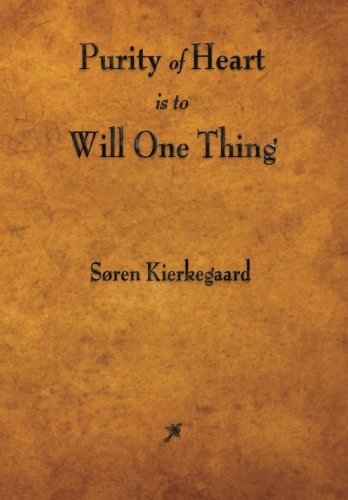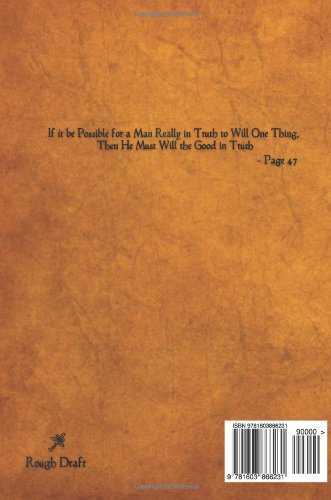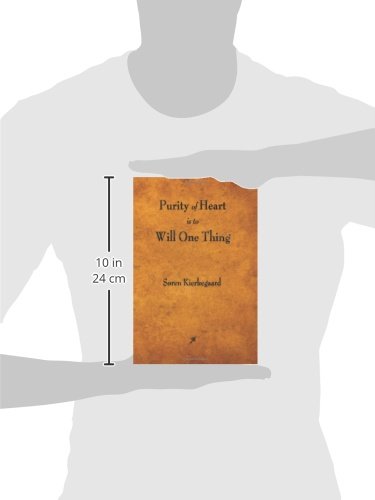



Purity of Heart Is to Will One Thing
D**M
No escape, no quarter given to yourself.
As a zen practitioner, rather than a devote Christian, (no they are not mutually exclusive but rather a leaning in a direction) I was moved and changed by this book. Yes it is difficult language, and Kierkegaard has the discipline or a logician. So I read it slowly. It helped me understand more fully the Three Pure Precepts of Mahayana practice; Embrace the Good, Avoid All Evil, and Purify the Mind. Kierkegaard calls up two Guides, one leading us towards Good and the other away from Evil. Purify the Heart or the Mind? Not an important distinction if you look at both in depth.He talks of the miracle of the Ultimate in powerful language "“Now the unspeakable is like the murmuring of a brook. If you go buried in your own thoughts, if you are busy, then you do not notice it at all in passing. You are not aware that this murmuring exists.But if you stand still, then you discover it. And if you have discovered it, then you must stand still. And when you stand still, then it persuades you. And when it has persuaded you, then you must stoop and listen attentively to it. And when you have stooped to listen to it, then it captures you. And when it hascaptured you, then you cannot break away from it, then you are overpowered. Infatuated, you sink down at its side. At each moment it is as if in the next moment it must offer an explanation.But the brook goes on murmuring, and the wanderer at its side grows older. "
K**R
Strong devotional read
This is one of my favorite books of all time. A slow reading will draw the reader into levels of inwardness hitherto unseen. There is a certain stability that comes from a life lived in willing only one thing.Extremely practical, full of logic, and containing the answer to life's most important question 'how then should we live'.
K**A
2013 Rough Draft Printing Edition - Needs editing
My review is for the actual publication of the book, not its content. Content wise - Kierkegaard's topic is challenging and inspiring. However, this particular edition by Rough Draft Printing 2013 is in serious need of editing. The numerous typos are distracting and annoying. I guess there is a reason that the publisher is named, Rough Draft Printing.However - I am not giving it the lowest rating, because the brightness, weight and feel of the paper combined with the font size and white space on the page make it easy to read the text and annotate it directly on the pages.The price point was nice too.
L**D
woody allen?
I'm dumbfounded that "rob" compared Kierkegaard with Woody Allen. Purity of Heart is all about the purpose and MEANING of existence. It's about reconciliation to the eternal. Woody Allen has no knowledge of the eternal. He's a silly little pundit using philosophy as a means to distract him from utter boredom and complacency. In his films he may drop references and allude to Sartre, Heidegger, Camu and the rest of the existentialists--but that's all he does. He's a geek for philosophy. He doesn't expound upon what they have said. He doesn't challenge them. He just collects their ideas and spreads them out on a table to gaze at. Kierkegaard is much different.
J**S
Game Theory Master
Before "game theory" had any footing in Western culture K presented the best case, which still holds, concerning the games played in internal conversations concerning the "double mindedness" of human beings. A must read for those who explore inner space. And, as K advises, read it aloud, so you can here in your own tone of voice your efforts spin the case.
M**I
Four Stars
Exactly what my brother in-law ordered.
A**Y
Terrible typos
Obviously the work of someone like Kierkegaard needs no defense from me. This review is for the editing of his work, which is terrible! Typos abound on every page, very much distracting from the content. I ordered this for a study group on this book and will never order from this publisher again.
J**R
Nice buy
Wonderful thinker. Good read for my soul. Old read are good reads and this man has some good reads. Glad I am reading it.
G**U
Kierkegaard recognizes that this is no easy path. He uses scriptural metaphors such as passing ...
Soren Kierkegaard has created a masterful penetration into the wiles of the human heart. His premise is that our highest calling as human beings is to attain a “purity of heart” which is to “will one thing”. He bases his meditation on James 4:8: “Draw near to God, and he will draw near to you. Cleanse your hands, you sinners, and purify your hearts, you double-minded”.Can any of us claim to have pure intention, unspoiled by the tainting of impure motivation or “double-mindedness”? Kierkegaard concludes in his final chapter that “you, my listener, and I must admit to ourselves that we were far from living in this way, far from that purity of heart which truthfully wills but one thing”.Our chief confession then must be a confession of conscience. Kierkegaard recognizes that this is no easy path. He uses scriptural metaphors such as passing through the eye of the needle and walking the straight and narrow way to describe the suffering that accompanies such sensitivity of conscience: For conscience is indeed “a blushing innocent spirit that sets up a tumult in a man’s breast and fills him with difficulties”. Kierkegaard recognizes that to persevere in such attentiveness to purity of heart or motivation “will make your life more taxing, and frequently perhaps wearisome. If persevered in, it may make you the target of others’ ridicule, not to mention even greater sacrifices that perseverance might choose to require of you”.I am reminded of the two forms of examen familiar to followers of Ignatian spirituality: examen of consciousness and the examen of conscience. Kierkegaard is clearly referring to the latter and understands that this is no easy road but one which is required for anyone longing for purity of heart.Among the barriers that Kierkegaard identifies to such purity of intention are: willing out of reward, willing out of punishment, willing out of ego. I wonder about all of the ways in which these impure motivations are rewarded within our belonging systems (which Kierkegaard refers to as the “crowd”) of religion and vocation. Consider the extent to which Christian evangelism rests heavily on these lesser motivations of reward and punishment, heaven or hell. When Jesus accused the crowd, even his closest followers, of only wanting his gifts and not his cross. Our preoccupation, if not obsession, with calculating and measuring outcomes in our vocations, ministries, and churches no doubt represents such a prominent barrier to willing the one good.Kierkegaard then goes on to identify the price of willing the one thing. Such a price includes the exposure of our numerous evasions, self-deceptions, and excuses for not willing the one thing and for avoiding the suffering that inevitably accompanies willing the one thing.It can be truly disheartening to submit to an examen of our conscience and recognize that rarely if ever can we claim to have pure motivation about any good that we may do for others. In fact, Kierkegaard suggests that the people most “busy” with doing good might be the ones least likely to slow down long enough to examine their motives for their good deeds and see the self-deception that lays hold on them: “But what does it profit a man if he goes further and further and it must be said of him: he never stops going further; when it also must be said of him: there was nothing that made him pause? For pausing is not a sluggish repose. Pausing is also movement. It is the inward movement of the heart. To pause is to deepen oneself in inwardness. But merely going further is to go straight in the direction of superficiality”.I wonder if there has been anything written quite like this in the past 150 years since Kierkegaard gave us this gift. Perhaps it is because our busyness for the cause of good has become the new norm. The crowd seems to demand it of us. The barriers to examining our intentions are strong and often impenetrable. When do we slow down long enough to examine our hearts for such purity of intention?
S**O
The best devotional book you'll ever read
The best devotional book you'll ever read, but take your time and read it a few times. It pays off.
S**A
Absolutely brilliant deconstruction of human motivations
This is a classic work. Absolutely brilliant deconstruction of human motivations.
D**L
Five Stars
A classic!
E**S
Insightful
Loved it - pick it up and read different sections for inspiration
Trustpilot
1 day ago
5 days ago